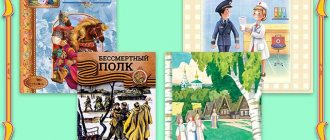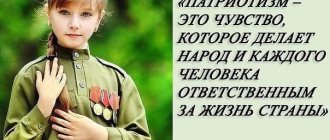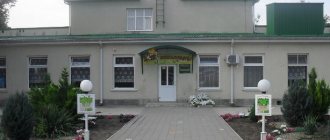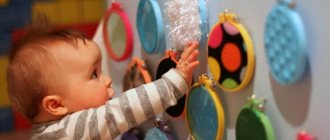Consultation for educators “Patriotic education of preschool children”
Much has been written about the importance of introducing a child to the culture of his people, since turning to the paternal heritage fosters respect and pride for the land on which you live. Therefore, children need to know and study the culture of their ancestors. It is the emphasis on knowledge of the history of the people and their culture that will help in the future to treat the cultural traditions of other peoples with respect and interest. Thus, the moral and patriotic education of children is one of the main tasks of a preschool educational institution. It should be emphasized that quite a lot of methodological literature on this issue is currently being published. Often it covers only certain aspects of the moral and patriotic education of children in specific types of activities and does not have a coherent system that reflects the entirety of this issue. Apparently, this is natural, since the feeling of patriotism is multifaceted in content. This includes love for one’s native places, pride in one’s people, a sense of inseparability with the outside world, and a desire to preserve and increase the wealth of one’s country.
Based on this, this work includes a whole range of tasks: - nurturing in a child love and affection for his family, home, kindergarten, street, city; — formation of a caring attitude towards nature and all living things; — fostering respect for work; — development of interest in Russian traditions and crafts; — formation of basic knowledge about human rights; — expansion of ideas about Russian cities; — introducing children to the symbols of the state (coat of arms, flag, anthem); — developing a sense of responsibility and pride for the country’s achievements; - formation of tolerance, a sense of respect for other peoples and their traditions. These tasks are solved in all types of children's activities: in classes, in games, in work, in everyday life - since they instill in the child not only patriotic feelings, but also form his relationships with adults and peers. The moral and patriotic education of a child is a complex pedagogical process. It is based on the development of moral feelings. The feeling of the Motherland... It begins in a child with the attitude towards the family, towards the closest people - mother, father, grandmother, grandfather. These are the roots that connect him with his home and immediate environment. The feeling of the Motherland begins with admiration for what the child sees in front of him, what he is amazed at and what evokes a response in his soul... And although many impressions are not yet deeply realized by him, but, passed through the child’s perception, they play a huge role in the formation of the personality of a patriot. Each nation has its own fairy tales, and they all pass on from generation to generation the basic moral values: kindness, friendship, mutual assistance, hard work. “These are the first and brilliant attempts of Russian folk pedagogy,” wrote K.D. Ushinsky, “and I don’t think anyone would be able to compete in this case with the pedagogical genius of the people.” It is no coincidence that K.d. Ushinsky emphasized that “... education, if it does not want to be powerless, must be popular.” He introduced the term “folk pedagogy” into Russian pedagogical literature, seeing in folklore works the national identity of the people, rich material for instilling love for the Motherland. Thus, works of oral folk art not only form a love for the traditions of their people, but also contribute to the development of personality in the spirit of patriotism. The immediate environment is of considerable importance for instilling in children interest and love for their native land. Gradually, the child gets to know the kindergarten, his street, the city, and then the country, its capital and symbols. The system and sequence of work on the moral and patriotic education of children can be presented as follows: Of course, this diagram cannot convey the fullness of the work on this issue. All these tasks are present, as it were, within the work of moral and patriotic education. The teacher’s task is to select from the mass of impressions received by the child those that are most accessible to him: nature and the world of animals at home (kindergarten, native land); people's work, traditions, social events, etc. Moreover, the episodes to which children’s attention is drawn should be bright, imaginative, specific, and arousing interest.
Therefore, when starting work on instilling love for the native land, the teacher must know it well himself. He must think over what is most appropriate to show and tell the children, especially highlighting what is most characteristic of a given area or region. Any region, region, even a small village is unique. Each place has its own nature, its own traditions and its own way of life. The selection of appropriate material allows preschoolers to form an idea of what one region is famous for. Hometown... We need to show the child. that the hometown is famous for its history, traditions, sights, monuments, and best people. What information and concepts about their hometown can children learn? A four-year-old child should know the name of his street and the one on which the kindergarten is located. The attention of older children needs to be drawn to the objects that are located on the nearest streets: school, cinema, post office, pharmacy, etc., talk about their purpose, emphasize that all this was created for the convenience of people. the range of objects that older preschoolers are introduced to. is expanding - this is the area and the city as a whole, its attractions, historical places and monuments. the children are explained in whose honor they were erected. An older preschooler should know the name of his city, his street, the streets adjacent to it, and also in honor of whom they are named. They explain to him that every person has a home and a city where he was born and lives. This requires excursions around the city, into nature, observation of the work of adults, where each child begins to realize that work unites people, requires them to be coherent, mutual assistance, and knowledge of their business. And here, acquaintance of children with the folk crafts of the region and folk craftsmen becomes of great importance. In moral and patriotic education, the example of adults, especially close people, is of great importance. Based on specific facts from the lives of older family members (grandparents, participants in the Great Patriotic War, their front-line and labor exploits, it is necessary to instill in children such important concepts as “duty to the Motherland”, “love of the Fatherland”!, “hatred of the enemy”, "feat of labor", etc. It is important to bring the child to understand that we won because we love our Fatherland, the Motherland honors its heroes who gave their lives for the happiness of people. Their names are immortalized in the names of cities, streets, squares, in their honor monuments have been erected. A continuation of this work is to introduce children to other cities of Russia, to the capital of our Motherland, to the anthem, flag and emblem of the state. However, it should be emphasized that the proposed system of moral and patriotic education can be modified depending on specific conditions. It is wrong to believe that By cultivating love for family, we thereby instill love for the Motherland.Unfortunately, there are cases where devotion to one’s home coexists with indifference to the fate of the country, and sometimes even with betrayal. Therefore, it is important that children see the “civilian face” of their family as early as possible. (Do they know why their grandparents received medals? Do they know their famous ancestors? Etc.) Showing through small things the dependence between the activities of one person and the lives of all people is what is important for the education of moral and patriotic feelings. Work organized in this way will contribute to the proper development of the microclimate in the family, as well as the cultivation of love for one’s country. For example, when raising children to love their city, it is necessary to bring them to the understanding that their city is a part of
Homelands, because in all places, big and small, there is much in common: everywhere people work for everyone (teachers teach children; doctors treat the sick; workers make cars, etc.); Traditions are observed everywhere: the Motherland remembers the heroes who protected it from enemies; People of different nationalities live everywhere, work together and help each other; people take care of and protect nature; there are general professional and public holidays, etc. To be a citizen, a patriot, is certainly to be an internationalist. Therefore, nurturing love for one’s Fatherland and pride in one’s country should be combined with the formation of a friendly attitude towards the culture of other peoples, towards each person individually, regardless of skin color and religion. Of course, a humane attitude towards people of different nationalities is created in a child primarily under the influence of parents and teachers, i.e. adults who are near him. This is especially true these days, when confrontations over these issues arise among some of the adult population. Therefore, it is especially important in kindergarten to support and direct the child’s interest in people of other nationalities, to tell where a given people live geographically, about the uniqueness of nature and climatic conditions on which their life, the nature of their work, etc. depends. By the end of the preschool period, the child should know: our country is inhabited by people of different nationalities; each people has its own language, customs and traditions, art and architecture; Every nation is talented and rich in craftsmen, musicians, artists, etc.
Thus, when solving the problems of moral and patriotic education, each teacher must build his work in accordance with local conditions and characteristics of children, taking into account the following principles: “positive centrism” (selection of knowledge that is most relevant for a child of a given age); continuity and succession of the pedagogical process; a differentiated approach to each child, maximum consideration of his psychological characteristics, capabilities and interests; a rational combination of different types of activities, an age-appropriate balance of intellectual, emotional and motor stress; activity approach; the developmental nature of learning based on children's activity. Planning this work is most appropriate on the following topics: “My family”, “My street”, “My kindergarten”. Work on each topic should include classes, games, excursions, unregulated activities of children, and on some topics - holidays. Thematic planning contributes to the effective and systematic acquisition by children of knowledge about their country, native land, and the area where they live. Moreover, the topics are repeated in each group. Only the content, volume of cognitive material and complexity, and therefore the duration of the study, change. It is advisable to time certain topics to coincide with specific events and holidays, for example, familiarization with rights and responsibilities - in December (before Constitution Day), Heroes of the Russian Land - in February (before Defender of the Fatherland Day), etc., thereby ensuring connection with public events.
The main form of moral and patriotic education of children is thematic classes. It is important that they increase children's mental activity. This is helped by comparison techniques (work on the collective farm before and now, abacus and computers, etc.), questions, and individual assignments. It is necessary to teach children to independently analyze what they see, make generalizations and conclusions. You can suggest finding the answer in the illustrations, asking your parents, etc. It should be emphasized that a preschool child is characterized by short-term interests, unstable attention, and fatigue. Therefore, repeated reference to the same topic only contributes to the development of children's attention and long-term preservation of interest in one topic. In addition1, it is necessary to combine into one topic classes not only in the native language, but also in familiarization with nature, music, and artistic activities (for example, “My city,” “The capital of our Motherland is Moscow”). Taking into account the age characteristics of children requires the widespread use of gaming techniques, which are important both for increasing the cognitive activity of children and for creating an emotional atmosphere of the lesson. For example, in the game “Souvenir Shop” the child is asked to determine: where, from what material a particular craft is made, what is it called (Khokhloma, haze, Gzhel). Thus, each topic should be supported by various games, productive activities (making collages, crafts, albums, thematic drawing). The results of work on a topic that unites children’s knowledge can be presented during general holidays and family entertainment.
It should be emphasized that difficulties in familiarizing children with everyday life, traditions, and individual historical moments are caused by the fact that preschoolers are characterized by visual-figurative thinking. Therefore, it is necessary to use not only fiction, illustrations, jokes, etc., but also “living” visual objects and materials (national costumes, antique furniture, dishes, tools, etc.). “Everyday Everyday Life” is extremely effective for introducing children to fairy tales, folk crafts, and antique household items. For this, it is advisable to visit museums, as well as organize special rooms in kindergarten. It is here that the child has the opportunity to gain his first insight into the history of life in his native land. In addition, in such a “room” the possibilities of presenting information through play (through fairy tale characters, etc.) are expanded. An equally important condition for the moral and patriotic education of children is a close relationship with their parents. Touching the history of your family evokes strong emotions in a child, makes you empathize, and attentively pay attention to the memory of the past, to your historical roots. Interaction with parents on this issue promotes respect for traditions and the preservation of vertical family ties. “In your family and under your leadership, a future citizen is growing <...> Everything that happens in the country must come to the children through your soul and your thought - this commandment of A.S. Makarenko must be used when a teacher works with both children and their parents. Currently, this work is relevant and especially difficult, requiring great tact and patience, since in young families the issues of instilling patriotism and citizenship are not considered important, and often only cause bewilderment. Involving the family in the moral and patriotic education of children requires special tact, attention and sensitivity from the teacher to each child. In this regard, it may be necessary to involve someone in searching for documents about family members. The voluntary participation of everyone is a mandatory requirement and condition of this work. It should be noted that nowadays people are interested in their genealogy, in the study of national, class, professional roots and their kind in different generations. Therefore, family study of their ancestry will help children begin to understand very important and deep postulates: everyone’s roots are in the history and traditions of the family, their people, the past of the region and the country; family is the unit of society, the keeper of national traditions; the happiness of the family is the happiness and well-being of the people, society, and state. Family excursions around the district, city or village, visits with parents to individual enterprises and institutions of the district, etc. are of great importance. The results of such excursions can be expressed in a photo exhibition, a joint performance with the child, or a film made.
It is no less interesting to conduct a “mini-research”. Moreover, the teacher, together with the parents, must choose and determine the topic of research, reasonably limiting its “territorial” and “time frames, for example, research not into the history of the village in general, but into the history of the street (on which the kindergarten is located or the children live), or the past of the house and destinies its inhabitants, the history of the sponsoring enterprise, etc. It’s good when family club activities include folklore activities (painting clay toys, folk weaving, etc.), as well as local traditional holidays and rituals, Christmas balls, Russian Maslenitsa, birch trees, etc. Of course, all this introduces children to the history of the region and their people, and fosters love for the Motherland.
Shishkina Natalia Nikolaevna
MBDOU No. 100 Miass, Chelyabinsk region
Consultation for teachers on patriotic education of preschoolers within the framework of the Federal State Educational Standard
The content of the Federal State Educational Standard notes the urgent need to intensify the process of instilling patriotism in preschoolers. Children at this age are very inquisitive, responsive, and receptive. They easily respond to all initiatives and are able to sincerely sympathize and empathize. For the educator, this is a time of fertile soil. Indeed, at this age great opportunities arise for the systematic and consistent moral education of children. The formation of the child’s spiritual foundation, emotions, feelings, thinking, processes of social adaptation in society takes place, and the process of realizing oneself in the world around us begins. It is this period of a person’s life that is most favorable for the emotional and psychological impact on a child, since his images are very bright and strong, and therefore they remain in memory for a long time, and sometimes for a lifetime, which is very important in the education of patriotism.
Recently, due to ongoing crisis phenomena in the socio-economic, political, cultural and other spheres of public life, there has been a sharp decline in the education of the younger generation. Of great concern is one of the key areas of this activity, related to the creation of conditions for the education and development of the personality of a citizen and patriot of Russia and capable of defending its interests. In this regard, the problem of patriotic education of children and youth becomes one of the most pressing. At the same time, it acquires new characteristics and, accordingly, new approaches to solving it as an integral part of the holistic process of social adaptation, life self-determination and personality formation.
Patriotic education of a child is the basis for the formation of a future citizen.
Pedagogical principles are known: love for the Motherland begins with an attitude towards the closest people - father, mother, grandfather, grandmother, with love for one's home, the street on which the child lives, kindergarten, school, city.
Patriotism and patriotic
upbringing
Patriotism is love for the Motherland, devotion to one’s Fatherland, the desire to serve its interests and readiness,
up to self-sacrifice, to his protection.
Patriotic education is a systematic and purposeful activity of government bodies and public organizations to develop in citizens a high patriotic consciousness, a sense of loyalty to their Fatherland, readiness to fulfill civic duty and constitutional responsibilities to protect the interests of the Motherland.
Patriotic concept
education of citizens of the Russian Federation.
The main tasks of patriotic education of preschool children
— formation of love for the native land (involvement in one’s home, family, kindergarten, city);
— formation of spiritual and moral relations;
— formation of love for the cultural heritage of one’s people;
- nurturing a love of respect for one’s national characteristics;
— self-esteem as a representative of one’s people;
- a tolerant attitude towards representatives of other nationalities, peers, parents, neighbors, and other people.
System of work on patriotic education of children
Familiarization with objects in the immediate environment.
— Fostering respect for working people and objects of folk art, artistic crafts;
— Fostering respect for working people and the objects they produce. To introduce people who have glorified Russia;
— Fostering a sense of friendship towards people of other nationalities;
Familiarization with the phenomena of social life.
— Fostering a sense of belonging to the life of the country (patriotic dates and holidays);
— A careful attitude towards what is made by people;
— Fostering love for the native land, for the Motherland (idea of the country, cities, capital, symbols of the state;
— Acquaintance with the sights of the city, architectural monuments, and the names of streets bearing the names of famous people;
— Acquaintance with the events taking place in the country, expanding ideas about the country, the capital, and the symbols of the state;
Getting to know nature.
— Fostering love for the nature of the native land;
— Fostering a caring attitude towards native nature;
— Fostering a sense of the need for labor participation in the protection of native nature.
Forms of work on patriotic education
— creation of a developing environment for civic and patriotic education;
— thematic classes;
-conversations about the Motherland, about the native city, about the nature of the native land, about good people, reading children's books on patriotic themes, an appropriate selection of songs and poems for learning, watching films, television programs for children, purposeful games;
— interaction with parents;
— interaction with society (excursions around the city, region, museum, exhibition hall).
Model of patriotic education in preschool age.
Family Kindergarten Hometown Home country Our Army
Vivid impressions about the native nature, about the history of the native land, about the Motherland, received in childhood, often remain in a person’s memory for the rest of his life and form in the child such character traits that will help him become a patriot and citizen of his country.



